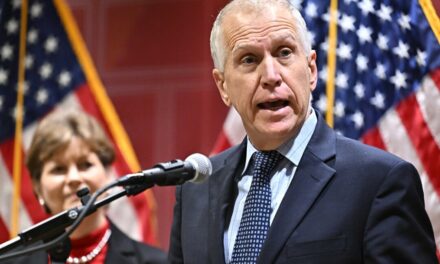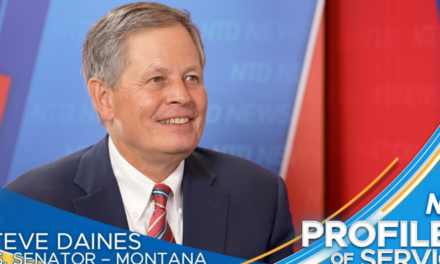We support our Publishers and Content Creators. You can view this story on their website by CLICKING HERE.
The Biden administration invested $4 billion in an infrastructure project in Africa to strengthen supply chains and now hopes Trump will continue the effort.
LUANDA, Angola—President Joe Biden wrapped up his trip to Africa on Dec. 4 that sought to lay the groundwork for a new U.S. strategy toward Africa that will endure beyond his presidency.
The Lobito Corridor project was the centerpiece of Biden’s three-day visit to Angola. He introduced the investment project last year as a strategy to diversify U.S. supply chains and reduce dependence on China.
The railway project connects the Angolan port of Lobito on the Atlantic coast to the mineral-rich areas of Africa. As China’s influence in the continent grows, many analysts saw this investment as Washington’s attempt to catch up and secure access to Africa’s critical mineral reserves.
Cargo that once took 45 days to get to the United States will now take less than 45 hours, Biden said on Dec. 4 during his visit to Lobito, calling it “a game changer” investment.
“So, my message today is simple: Let’s keep it up,” Biden said.
Biden was warmly welcomed during his visit. Upon arriving at the Catumbela airport to visit the Lobito port terminal on Dec. 4, he was greeted by President João Lourenço of Angola and given a red carpet reception. Nearly 20 dancers, dressed in vibrant red, yellow, white, and black costumes, performed songs and dances. Three multi-story-tall billboards at the airport displayed images of Biden and Lourenço shaking hands. These pictures were also seen throughout the capital city of Luanda, where Biden spent the first two days of his visit.
Both leaders recognized the progress made over the past several years, despite Angola’s close ties to the Soviet Union during the Cold War. The country’s flag resembles the old Soviet flag with a red and black background and featuring a yellow emblem of a machete, a star, and half of a cogwheel.
After gaining independence from Portugal in 1975, Angola descended into civil war due to a power struggle between two former anti-colonial guerrilla movements. The communist People’s Movement for the Liberation of Angola (MPLA), supported by Cuba and the Soviet Union, clashed with the anti-communist National Union for the Total Independence of Angola (UNITA), backed by the United States and South Africa.
The civil war ended shortly after the government troops killed UNITA leader Jonas Savimbi in 2002. Lourenço’s party, the MPLA, has governed Angola since the country’s independence in 1975, throughout the civil war, and continues to hold power today.
Angola’s real shift towards the West began after Lourenço came to power in 2017.
America’s relationship with Angola is considered similar to its relationship with Vietnam. As it in Vietnam, many Angolan leaders, including Lourenço, studied in the Soviet Union or Cuba.
“They are ideologically Cubans,” Mvemba Phezo Dizolele, director and senior fellow at the Washington-based think tank CSIS, wrote in a recent note.
Angola has large reserves of oil and diamonds, and is the second-largest oil producer in sub-Saharan Africa. However, the country is struggling with significant debt, including $17 billion owed to China due to its Belt and Road Initiative (BRI). Angola is estimated to divert two-thirds of its oil production to service its China debt.
Angola, once a war-torn country, also struggles with corruption, poverty, and human rights abuses.
The country needs to do more to promote democracy and transparency, Michael Walsh, senior fellow in the Africa program at the Foreign Policy Research Institute, told The Epoch Times.
He noted that Angola’s problems posed a potential vulnerability for the White House ahead of the trip, as the promotion of democracy and human rights are central goals of U.S. foreign policy.
Olivio Nkilumbo, a member of parliament in Angola and a vocal critic of Lourenço’s government, said Biden could have been more assertive in urging the government to uphold democracy and human rights during his visit.
“The U.S. can pour endless amounts of money in[to] Africa but none of this will have a real effect on the people if our governments aren’t serious,” he told The Epoch Times.
He stated that Angolans appreciated Biden’s visit, even though it came late in his presidency.
“But where is the democracy? Where is human rights? Where is the rule of law?”
Despite its oil wealth, the uneven distribution of resources remains a big issue in many African countries, including Angola. Its capital, Luanda, features a stark contrast between wealth and poverty, with high-rise luxury residences and corporate buildings towering over shantytowns scattered throughout the city.
Lobito Corridor Project
Biden has sought to frame the Lobito Corridor project not just as an opportunity for the United States to access critical minerals in Africa, but also as a way to expand the continent’s economic opportunities.
During his trip, he toured the Lobito port terminal and held meetings to review the progress made in the multi-billion-dollar railway infrastructure project.
The nearly 1,000-mile railway project spans three countries, linking Lobito port to the mineral-rich areas of the Democratic Republic of Congo (DRC) and Zambia’s Copperbelt.
In 2022, the Lobito Atlantic Railway concession was awarded to a consortium of Western companies that outbid Chinese competitors.
A year later, the United States and the European Union announced their commitment to provide both “financial resources and technical know-how” to support the development of the Corridor.
During his visit, Biden participated in a summit hosted by Lourenço, alongside the presidents of the DRC and Zambia and the vice president of Tanzania.
“We’re not just laying tracks,” Biden told the African leaders. “We’re laying the groundwork for a better future for our people.”
During Biden’s term, the United States has spent nearly $4 billion on the Lobito Corridor, according to the White House. Other participants, including the Italian government, the Africa Finance Corporation, and the African Development Bank, also provided financing on a smaller scale.
“Collectively, this group mobilized over $6 billion in private and public investments,” Biden said.
During the summit, the U.S. president announced an additional $600 million in financing for the broader Lobito Corridor projects, which include investments in agricultural infrastructure, high-speed mobile networks, and railway upgrades.
Many are now questioning the future of the project under the incoming Trump administration.
“Look, at the end of the day, if you want to talk about living in an era of global competition, specifically with China, this Lobito Corridor is the heart of that,” a senior administration official told reporters in Angola on Dec. 3.
“I believe they will continue this project because it is good for American national security, it’s good for American economic security.”
The railway project is considered a major effort by Biden to respond to communist China’s BRI, also known as “One Belt, One Road” in Africa.
The BRI is considered a tool for Beijing’s so-called debt-trap diplomacy, which burdens many poor countries with enormous debt and eventually allows the Chinese regime to take control of their infrastructure.
Trump’s Prosper Africa Initiative
Walsh said that the investment approach to counter China is not unique to Biden, referring to the Trump administration’s Prosper Africa initiative.
“That’s exactly what the first Trump administration was doing,” Walsh said.
The focus on investment in Africa and competition with China traces back to the Trump administration, he said.
Walsh, however, pointed out that while Biden placed significant emphasis on the African Union, president-elect Donald Trump may prefer to engage with countries on a bilateral basis, as he did during his first term. This approach could shift U.S. foreign policy toward Africa and other regions.
The Democratic Republic of the Congo (DRC) alone holds more than 70 percent of the world’s cobalt, an essential mineral used in batteries that power smartphones, computers, and electric vehicles. The conflict-wracked country is also the top copper producer in Africa. Both cobalt and copper are considered essential to the U.S. economy and defense industrial base.
Zambia also has abundant mineral wealth, particularly in its Copperbelt region, which is rich in copper and cobalt. The country is the second-largest producer of these two key metals in Africa, after the DRC.

 Conservative
Conservative  Search
Search Trending
Trending Current News
Current News 







